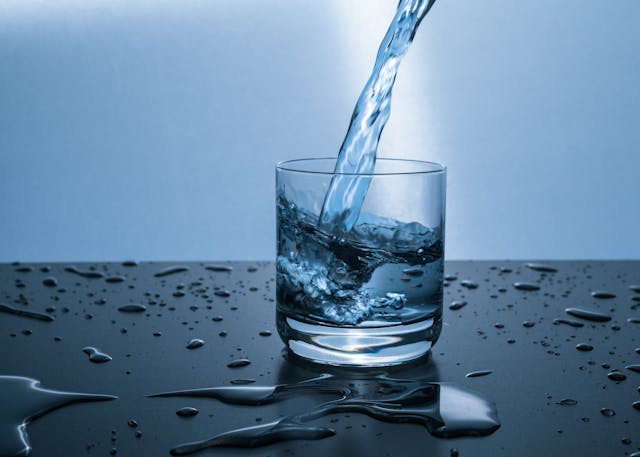
What happens if you drink too much water? Your brain can swell up and you can have seizures and possibly even die.
Overhydration is the opposite of dehydration, and just like dehydration can be fatal, overhydration can be as well. However, it is much harder to be overhydrated than it is to be dehydrated. To be dehydrated, all you have to do is not drink anything. To be overhydrated, you have to force yourself to drink an enormous amount of water in a very short time, which, if you have tried to chug a liter of water, you will know is not an easy thing to do. So, what happens?
If you drink too much water, there are two problems. The first is that the level of sodium in the blood will drop because it becomes heavily diluted. Having very low levels of salt in the body is called hyponatremia. Our body relies on salt for many processes. We use it to keep the right levels of fluids in the right places, we use it to conduct electrical impulses across the nerves, and we use it to contract and relax our muscles. When salt is dissolved in water, it conducts electricity very well and is known as an electrolyte. If we don’t have enough salt, we will have trouble with all of these processes, which will obviously cause a lot of problems.
The second problem is directly connected to the first and is why overhydration can be fatal. Our kidneys constantly monitor the amount of salt in the blood. If it is too high, the kidneys are stimulated to excrete as much sodium as they can, as quickly as they can. More water is moved out of the blood and cells to create urine to flush out the salt. When salt levels are too low, the opposite happens. The kidneys are stimulated to stop flushing salt out and they start to retain water and urine. The extra fluid is stored in the blood or in the cells. This works if the body really is low on sodium, but if the reason for the low levels is excess water, retaining the water is the worst thing possible. When the cells retain water, they swell up. This is fine over most of the body, but in the brain, it is very dangerous. If the cells in your arm swell up, your skin will stretch to accommodate them. If the cells in your brain swell up, your skull will not expand and the brain will be squashed against the inside of the skull. If the swelling continues, the brain stem will be forced out of the bottom of the skull. This will cause seizures, and, if it continues, death.
This all sounds terrible, but it is very rare because for this to happen, you need to consume an enormous amount of water in a very short time. Right now, the gallon challenge is a big thing. People drink 4 liters of water every day over a week. That is far more water than the body needs, but it is not enough water to cause overhydration. To overhydrate, you would need to drink over 4 liters of water in one hour, or over 1 liter of water every hour throughout the whole day, so 24 liters. These kinds of quantities are not easy to do. If you don’t drink more than 1 liter an hour, then there will be no problem because your body is very efficient at keeping the status quo. If your kidneys are working properly, they will sense the low sodium levels and will be able to rid your body of approximately one liter of water every hour. That will keep your sodium levels even and it will prevent your cells from swelling up.
There are a lot of videos on Instagram and TikTok that say you need to drink more and more water, but it won’t have any effect because your body will try just as hard to get rid of it. You only need a certain amount and that depends on your size, how much you move, and how hot it is. A lot of the water we get comes from our food, so we don’t need to be drinking liters a day and our body will just get rid of it. 2 to 3 liters a day, including the water you get from food and other liquids such as coffee is plenty. It has also been shown that drinking water has no effect on weight loss. Some people drink before a meal to fill themselves up, but water is out of the stomach in less than twenty minutes and experiments have shown that people who drink water before eating eat the same amount as people who don’t drink. One interesting study has shown that if you mix the water with your food, such as a soup, you will consume fewer calories. And this is what I learned today.
Photo by Pixabay: https://www.pexels.com/photo/fluid-pouring-in-pint-glass-416528/
Sources
https://www.msdmanuals.com/en-jp/home/hormonal-and-metabolic-disorders/water-balance/overhydration
https://www.medicinenet.com/is_drinking_4_liters_of_water_a_day_too_much/article.htm
https://www.healthline.com/health/overhydration#treatment
https://www.healthline.com/health/hyponatremia#What-does-it-mean-to-have-hyponatremia?

Pingback: What happens if you drink too much water? - English Reading Practice